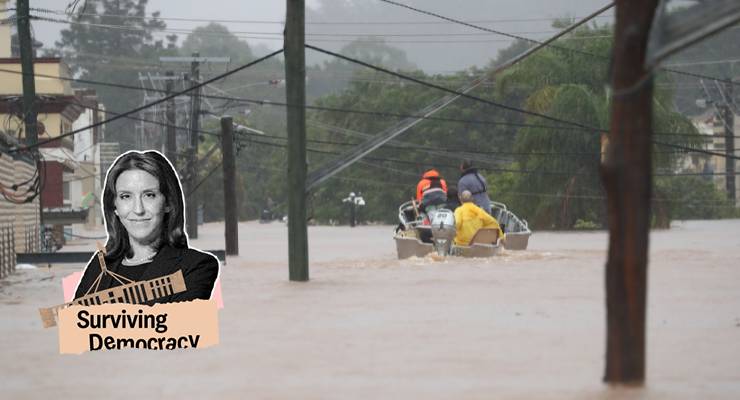
Public policy debates are about more than values. They usually include facts about what is, and predictions based on those facts about what’s coming. Informed speculation, some might call it or, for the cynical, crystal-ball gazing.
But eventually the future arrives, proving one side right and the other mistaken. In personal relationships — at least those doomed to failure — the vindicated might crow: “I told you so.” But this rarely happens in policy debates.
A case in point is climate change. Since the early 19th century, scientists have been pointing to data indicating humans were changing the climate. By the 1990s, the scientific consensus was that human-caused emissions were warming the globe with devastating consequences.
Australian scientists warned about the risks to our continent of a rapidly heating climate, including extreme heat, floods and more dangerous bushfire conditions, all of which have become a reality in the decades since.
From the death of about half the coral on the Great Barrier Reef, the massive floods devastating Queensland and NSW, the droughts across the south-east, and record-breaking heat in Sydney, most of the informed speculations have proved correct.
And this is with just 1 degree of warning. At 3.5 degrees, which is what we are on track to reach, the situation will get far, far worse.
But as every terrible prediction has been realised or surpassed, there has been little in the way of “I told you so”. With rare exceptions, those proved right on the risk carbon emissions posed to the stability of the climate have kept their finger-wagging to a minimum, focusing instead on generating the political will required to make the cuts to emissions we now require: ones more drastic, expensive and painful than they would have been had we acted 20 years ago.
Why all the good manners? Especially when it’s likely that if the shoe were on the other foot, climate deniers like Lord Monckton and Ian Plimer and their media cheer team of Miranda Devine, Janet Albrechtsen and Andrew Bolt would be skywriting “I told you so” across every capital city sky.
My hunch is that etiquette has nothing to do with it. Instead, the circumspection of scientists and the activists that rely on their work is pragmatic.
The bottom line is that we still have to work with these people. Having finally reached the summit of the conceptual mountain that climate change is real — and really dangerous — we must still agree on the changes we make to business-as-usual to reduce our emissions, and a timeline. Nothing puts the kibosh on effective negotiations more quickly than one side lording it over the other, making them feel stupid and disrespected.
Plus, the climate-change-is-a-hoax people have not admitted they’ve been proved wrong.
This is what bothers me. Not an unsatisfied yen to say how right I was. But a need to know that those who put me, my children and everyone I love in peril recognise and accept their error so we can have some hope they won’t do the same thing again.
What was their mistake? Ignoring that rare thing in science — a consensus. Not because they had one good reason to doubt the experts but because they found the truth too scary, and what they had to do to respond to it too inconvenient or costly.
So they wished the problem away.








Lack of crowing is because none of the people in climate science take pleasure in being right given the implications for the next generation. Natural systems also keep you a bit humble when nasty surprises we didn’t see coming pop up. We would like to see more effort by the media to highlight the damage inflicted by the deniers though.
I don’t think it was that the truth was too scary. I think it was greed and lust for power or determination to hold on to it at any cost.
a mate of mine, an ex-CEO, told me that many of his peers couldn’t bring themselves to vote green because it would mean admitting they were wrong – for many this would mean that, to continue prospering from denials and inaction, they would have to admit they were the bad guys – but for others, these captains of industry were to afraid to admit that the world is in jeopardy
Leslie, as a philosopher, you will appreciate that all prediction outside physics is uncertain to varying degrees, but often in a 50/50 basis. Despite Capitalism’s hypocritical demand for ‘certainty’ about the future, authentic scientists inherently understand the uncertainty principle. By contrast the deniers construct their fallacious arguments on the admission f uncertainty by scientists, as has religion through the ages.
But as you point out that when, accounting the uncertainty principle, when so many scientists have concluded that the probability of climate change is almost certain, it demonstrates how monumentally dishonest and evil is the faux certainty of idiot deniers. That they are so conceited, or more likely corrupt, beggars belief. But evil never acknowledges evil and never apologises for its dishonesty.
Whoever down voted this (cancelled out by my up vote) probably didn’t follow it. But I would quibble with the word evil. Ignorant, blind, stubborn maybe.
Yep, I go with ‘evil’, because it encompasses the willful moral degeneracy of it – much more than simple ignorance. These bastards would spend > $1,000 year after year to insure their nice houses against the microscopic likelihood of flood, fire, earthquake, etc, but rail against doing anything about a catastrophe with a near 100% level of probability.
We must include governments because they are given the best, up to date, scientific advice by the people who really know what they are talking about. Then they ignore it and continue their purile political games. Their names should be chiseled on the marble block of history and erected in the parliamentary grounds.
And maybe because “Ha Ha! The world is stuffed and we’re all going to die. I told you so! Na na na na naaaa!” isn’t something anyone wants to crow about?
Greta Thunberg has been calling for “Action”. At last the people are beginning to agree that maybe Action would be a good idea. The engineering revolution required between now and 2050 is feasible. But people murmuring in the beer is a long, long way short of of the political Action necessary to zeroise fossil fuels worldwide.